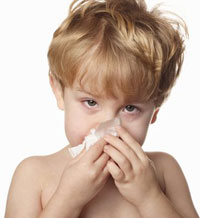Childrens Health
Medical Certificates
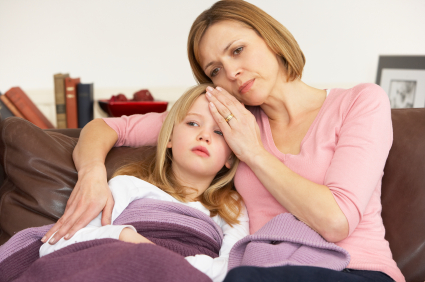 MEDICAL CERTIFICATES
MEDICAL CERTIFICATES
(WORK, EXAMS, SCHOOL)
If you are unable to attend work, exams or school you may be required to provide a medical certificate. This can be obtained by visiting the doctor and by proving that you are sick or unfit for work, school or exams.
Influenza
Influenza
Colds are not flu
Influenza (or flu) is a serious illness. A 'common cold' is often called the 'flu', but they are different. Flu symptoms usually start suddenly with a high fever and you may feel sick enough to go to bed. Symptoms can also include irritation in the throat or lungs, a dry cough, shivering, sweating and severe muscle aches. The flu tends to make the whole body ache, whereas the common cold usually affects the nose and throat only.
Influenza is an illness that usually starts quite suddenly, about 1 to 3 days after a person is in contact with someone who has the infections.
Children and adults with the flu often feel very unwell and develop a fever, headache, body aches and loss of appetite. They have a runny nose, cough and chills and feel very cold and shivery and may have a high temperature. The viruses causing flu often change a little, so that people who have had the flu before many not be protected by their immune system and can get the flu again.
Some serious diseases may initially appear like a cold or flu but may require urgent medical attention. The best thing to do is to see your doctor if the symptoms come on suddenly, are severe or last longer than usual.
See your doctor if you or your child develops any of the following:
- temperature higher than 38.5 oC or chills
- neck stiffness
- severe headache
- light hurting the eyes
- chest pain
- shortness of breath, noisy or fast breathing or difficulty breathing
- a skin rash
- pale or mottled skin
- vomiting
- difficulty waking up or unusual drowsiness
- persistent cough
- aching muscles
OR if your child or baby has any of the following:
- bulging of the fontanelle (soft spot on top of the baby's head)
- a high temperature (in babies under 6 months of age)
- excessive irritability
- a strange, high-pitched cry
- lack of energy
- loss of appetite/not drinking/feeding poorly
- earache.
At this point it may be a good time to ensure your child's immunisations are up to date.
Your doctor can check the severity of the illness, tell you how long it may last, give advice on treatment and provide a medical certificate for work, school, university or exams if needed.
Influenza Vaccine
Influenza vaccine is recommended in Autumn for people who are at risk of serious complications. Influenza vaccination will not prevent you from getting common colds as they are different viruses.
Mental Health Plans
Mental Health Plans

A Mental Health Care Plan is a plan made by your doctor for treating a mental health problem over time.
Your Doctor will work with you to assess your mental health, work out what help you need, set goals and choose the treatment that would be best for you. Your doctor will also discuss options for treatment and advise you about any other services that might help you. (The plan might also include what to do in a crisis or to prevent relapse.)
Once you and your doctor have agreed on your goals and what you need to do to achieve them, your doctor will write out a mental health care plan. Preparing the plan may take a number of visits.
Allergies
Allergies
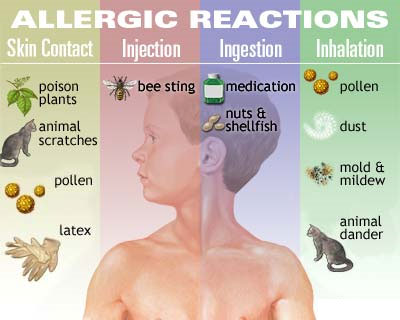
An allergy is an abnormal reaction by a person's immune system against a normally harmless substance. A person without allergies would have no reaction to this substance, but when a person who is allergic encounters the trigger, the body reacts by releasing chemicals which cause allergy symptoms. However, just because there is a cause and effect between exposure to a substance and the development of symptoms does not always mean that a person is allergic to that substance.
Allergies can be:
- Nasal Allergies
- Hay Fever
- Skin Allergies
- Food Allergies
- Drug and Medicine Allergies
- Insect Allergies
If you think you may have had an allergic reaction.
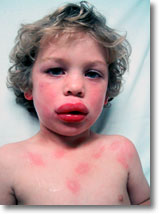
This little boy is suffering severe facial swelling and urticaria.
These are not life-threatening in themselves but may lead to more severe symptoms, such as anaphylaxis.
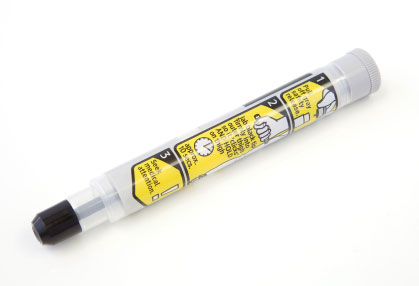
EpiPen® Auto-Injector is the #1 doctor prescribed epinephrine Auto-Injector for those with a history of anaphylaxis. EpiPen® helps stop allergic reactions fast - giving you time to get the emergency medical help you need.
Infections
Infections
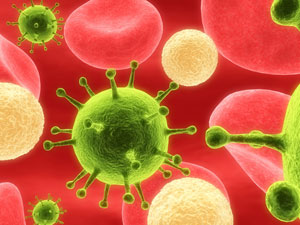
Many human illnesses are caused by infection with either pathogenic (disease-causing) bacteria or viruses. To cause disease, these micro-organisms must gain access to the body. Bacteria reproduce by splitting in two, while viruses replicate themselves inside host cells. Many bacterial infections can be treated successfully with antibiotics, but these are useless against viral infections.
Types of Infections
- Skin
- Eye Infections
- Viral Infections
- Ear Infections
- Wound Infection
- Urinary Tract Infections
- Bacterial Infections
- Kidney Infections
- Chest Infections
- Stomach Infections
- Fungal Infections
- Cold and Flu
- Lung and Respiratory
- Parasitic Infections
Puberty
Puberty

Puberty is the time in our lives when our sexual and reproductive organs mature. This means our bodies become capable of creating babies. Long before any outward changes happen, special
hormones begin to be produced inside the bodies of both girls and boys. These hormones affect many different things, including sexual development and growth.
Puberty starts around 11 years for girls and 12 years for boys, give or take a year or so. Physical changes become obvious at about 11 to 14 years for most girls, and about 13 to 16 years for most
boys. Along with these physical changes come emotional changes. We also start to think differently at this time in our lives. There are quite a few major changes to deal with during puberty.
Physical changes for girls
• Height – you’ll grow taller.
• Curves develop – your hips widen and your body is becoming curvier.
• Breasts begin to form – the first stage is called ‘budding’. Sometimes your breasts may be different sizes. This is normal. If you’re worried, see a doctor.
• Hair growth – hair will start to grow around the pubic area and underarms, while hair on the legs and arms darkens.
• Vaginal discharge – you may start to get a whitish discharge from the vagina. This is a natural self-cleaning process the vagina uses and it’s nothing to worry about.
• Periods – your menstrual periods start. The bleeding from your period is not like bleeding from injury; it’s a normal process where the body removes the lining of the uterus (womb) that has built up over the last month.
• Period pain – You may start to have period pain just before, or at the beginning of, a period. Warm drinks and a hot water bottle (held to the tummy) can be helpful. For some women, exercise helps. See a doctor if you have too much pain. Sometimes, medication is needed.
Menstrual periods
You can’t tell for sure exactly when you’ll get your period. Usually your period will start off lightly, so you will have plenty of time to get to the bathroom. You may notice you feel damp or wet.
Some women get period pain or cramp in the lower abdomen (tummy) that tells them that they’ll get their period soon. You may notice a slight clear or whitish discharge between periods, before you get your first period, or both.
Periods can be irregular, especially at first. They may vary both in how often they happen and how long they last. After the first year or so, periods tend to become fairly regular; usually they come about once every four weeks.
Pads and tampons
Carry a sanitary pad or tampon in your purse or school bag to be prepared. A pad is usually the easiest to use at first. Change pads and tampons regularly, at least two or three times a day, depending on the menstrual flow.
It’s important to make sure that the vagina does not get too dry, so you may need to use smaller tampons or a pad when your flow is light. Tampons have been associated with toxic shock syndrome (a very serious illness) when not changed regularly.
Physical changes for boys
If you’re a boy, the physical changes you’ll notice around puberty include:
• Height and muscles – you’ll get taller and stronger and start to develop muscle mass.
• Genitals – your testicles and penis size increase. It’s normal for one testicle to be bigger than the other. Some young men worry about their penis size; however, sexual functioning
– including the ability to have sexual intercourse and father children – doesn’t depend on penis size. If you’re worried, have a chat to a doctor or health professional.
• Hair growth – body hair begins to grow around the pubic area, legs, underarms and on the face. The hair starts off fine and becomes coarser and darker over the years of
puberty. Some men continue to grow a bit and develop more body hair right into their 20s.
• Voice changes – in puberty, the voice becomes deeper. This is sometimes called ‘voice breaking’ because of the ups and downs in tone.
• Wet dreams – nocturnal emissions, or wet dreams, can happen in your sleep. Wet dreams are an ejaculation of semen – not urine – that has dampened your sheets. This is a normal part of growing up.
• Erections – sometimes erections can happen because you’re nervous or excited, or just for no reason at all, and can make you feel embarrassed. Other people usually don’t notice them as much as you do and they go away within minutes.
• Breast changes – some boys’ breasts may grow slightly or feel tender. This is a normal reaction to the hormones in your body. This will eventually go away.
Emotional changes
Although puberty refers to the physical changes of the body, there are also many emotional changes taking place, which affect boys and girls. They include:
• Coping with your changing body – young people have to deal with rapid physical change; all of a sudden, you have a new body shape and you may begin to feel selfconscious about how you look. You might feel embarrassed if you feel different to your friends. Other people may start to respond to you differently. You look older and may be treated as an older person.
• Frustration because you feel different – it can be difficult to cope with early physical changes or it also can be frustrating waiting for physical changes to happen.
• Mood swings – the rapid and abrupt release of hormones into your body can bring about extremes in emotion and mood. It’s a temporary imbalance and will settle down. Your parents might complain about your moods, but remember … it’s not the real you. It’s just those wild hormones affecting the way you feel.
• Energy changes – the fast physical growth and other changes in your body can mean you swing between having boundless energy and being extremely tired.
Your thinking will change
The way you think changes around this time. You’re starting to choose your own standards and ideals; to form your own ideas, morals and values; and to rely less on your parents for knowledge about life and the world. You may be starting to think about some deep questions like ‘Who am I?’, ‘Why am I here?’ or ‘What is the meaning of life?’.
You’re developing your own identity as an individual rather than as a part of the family. This could mean showing your parents or the world that you have very different individual tastes in your personal style. Some young people choose to do this in wild ways, while others take a more subtle approach.
Your relationship with your parents
You may want more independence, while – on the other hand – not wanting to give up the support of your parents just yet. This can mean that one minute you feel quite adult and the next you’re feeling like a child again. It may mean that you act impulsively at times and engage in some risktaking behaviour.
Parents sometimes worry a lot when you want to go out on your own and do things independently, because they don’t want you to come to any harm. They may either know first hand or have heard of some people who take advantage of young people. They’re probably quite aware of the risks that some young people take (they may have done it themselves).
What this means is that there can be conflict between parents (who want their child safe) and a young person who wants independence. Try to sit down and work it out calmly with your parents.
Getting through puberty
Puberty can be an unsettling time. It can also be an exciting time, as you move from childhood to adulthood, and take on all the rights and responsibilities of adulthood. Puberty can be difficult for parents and for young people as everyone adjusts to the changes.
Everyone needs to have patience. Parents are learning too. If there are disagreements, listen to what they have to say and let them know your point of view. Show them that you can take care of yourself in a mature and wise fashion.
Try to be considerate – for example, let your parents know where you are and if you have a change of plans. These small things can make a huge difference. They will show your parents that you can act responsibly and safely.By handling situations calmly and maturely, your parents will build up their trust in you and come to realise you are on the way to being able to take care of yourself
Sleep Apnea
Sleep Apnea

Sleep Apnea means absence of breath. Sleep apnea occurs when the airway from the mouth to the lung collapses during sleep. The person with sleep apnea may have hundreds of these episodes throughout the night, disrupting their sleep and reducing oxygen supply to vital organs. Sleep apnea is a common condition affecting about 5% of adults. Fortunately effective treatment is available and once treated the person with sleep apnea leads a normal healthy life.
People with sleep apnea usually snore loudly and have restless sleep. Sleep apnea is associated with heart attacks and stroke. Signs and symptoms such as snoring, obesity, observed apnea and sleepiness in the day may suggest that a person has sleep apnea but the best way to be really sure is with an overnight sleep study. In the sleep study the patient is wired up and attached to computers which measure their sleep, their breathing and oxygen levels. In many people sleep apnea results from being overweight. If this is the case, losing weight may help or even cure the apnea. In any case, losing weight may assist with cardiovascular disease such as high blood pressure and with diabetes management.
Children's Immunisation
Children's Immunisation

The Doctors at Aches and Pains Medical Practice are to offer regular Baby Health Checkups.
For all Baby Health Checks please bring your Personal Health Record Booklet. This booklet will be filled out to keep a complete history of your childs health and development.
After the consultation with the doctor we are able to offer to you the services of a registered nurse who is able to perform a full health check which includes weighing and measuring your baby and giving any baby vaccinations that are due.
We are able to provide a Bulk Billed consultation and Free Childhood Immunisation Service.
Health checks are recommended as follows:
- With the GP within 5- 10 days of baby being discharged from hospital.
- An initial assessment with a GP between 0 – 4 weeks.
- Subsequent checks at 2 months, 4 months, 6 months, 12 months, 18 months an older as recommended by your Doctor or GP.
All consultations and baby immunisations provided by our Doctors will be Bulk Billed Service.
Current Immunisation Schedule
The National Immunisation Program (NIP) Schedule (0 - 4 Years)
Valid from 1 July 2007
Age |
Disease immunised against |
|
Birth |
Hepatitis B |
|
2 months |
Diphtheria |
|
4 months |
Diphtheria |
|
6 months |
Diphtheria |
|
12 months |
Measles |
|
18 months |
Varicella (refer to note 4) |
|
4 years |
Diphtheria |
Note:
1. Pneumococcal vaccine is funded under the NIP for children born from 1 January 2005.
2. Four doses of Hib vaccine are due at 2, 4, 6 and 12 months of age when 'PRP-T Hib' containing vaccine is used.
3. Meningococcal C vaccine is funded under the NIP for children born from 1 January 2002.
4. Varicella vaccine is funded under the NIP for children born from 1 May 2004.
5. Rotavirus vaccine is funded under the NIP for children born from 1 May 2007.
6. Three doses of Rotavirus vaccine are due at 2, 4 and 6 months of age when RotaTeq vaccine is used.
Depression & Anxiety
Depression
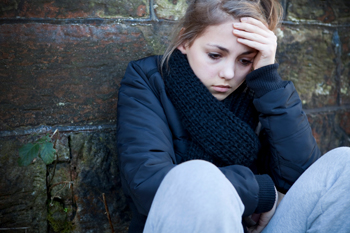
Depression is more than just a low mood - it's a serious illness. While we all feel sad, moody or low from time to time, some people experience these feelings intensely, for long periods of time and often without reason. People with depression find it hard to function every day and may be reluctant to participate in activities they once enjoyed.
Depression is one of the most common of all mental health problems. One in five people experience depression at some stage of their lives.
Anxiety Disorders
Anxiety disorders are a group of psychiatric or psychological disorders. They include generalised anxiety disorders, social phobias, specific phobias – for example, agoraphobia and claustrophobia – panic disorders, obsessive compulsive disorder (OCD) and post traumatic stress disorder. Untreated anxiety disorders can lead to depression.
Anxiety disorders are common mental health problems that affect many people. Approximately 25 per cent of the population have an anxiety disorder that warrants treatment at some time in their life and up to another 25 per cent have less severe anxieties such as fears of spider and snakes.
Not all anxiety is a disorder
Everyone experiences anxiety and fear at times; they are normal and helpful human emotions that help us deal with danger. However, some people experience excessive and irrational anxiety, and worries that become ongoing and distressing and that interfere with their daily lives. This may indicate an anxiety disorder. Often there appears to be no obvious or logical reason for the way the person feels. This may make an anxiety disorder even more worrying to the sufferer.
Symptoms of anxiety disorders
The main features of an anxiety disorder are fears or thoughts that are chronic (constant) and distressing and that interfere with daily living. Other symptoms of an anxiety disorder may include:
- Panic or anxiety attacks or a fear of these attacks
- Physical anxiety reactions – for example trembling, sweating, faintness, rapid heartbeat, difficulties breathing or nausea
- Avoidance behaviour – a person may go to extreme lengths to avoid a situation that they think could bring on anxiety or panic.
Panic attacks are a common symptom
A panic attack is a sudden feeling of intense terror that may occur in certain situations or for no apparent reason. A panic attack does not mean a person is necessarily suffering an anxiety disorder. However, a panic attack is a common feature of each type of anxiety disorder. Symptoms of a panic attack may include:
- Shortness of breath
- Dizziness
- Rapid heartbeat
- Choking
- Nausea.
The cause of panic attacks is unknown but they may be related to a chemical response in the brain, caused by actual threatening or stressful events or by thinking about stressful events. The brain response leads to physiological changes in the body, such as shallow breathing and rapid heartbeat.
Panic attacks can be frightening. Some people say they feel like they are going to die or go crazy. People affected by panic attacks may avoid situations in which they think attacks might occur. In some cases, this may lead to the development of other anxiety disorders including agoraphobia.
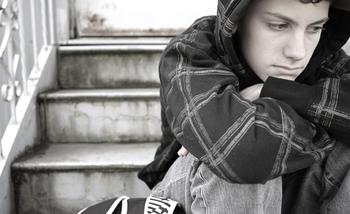
Types of anxiety disorders
Anxiety becomes a disorder when it is irrational, excessive, too persistent and attached to situations that do not warrant it and when it interferes with the person’s daily life. Anxiety disorders include:
- Generalised anxiety disorder
- Social phobias – fear of social situations
- Specific phobias – for example a fear of open spaces (agoraphobia) or enclosed spaces (claustrophobia)
- Panic disorders – frequent and debilitating panic attacks
- Obsessive compulsive disorder
- Post traumatic stress disorder.
Generalised anxiety disorder
Generalised anxiety is excessive anxiety and worry about common issues. The focus of the anxiety might be family or friends, health, work, money or forgetting important appointments. A person may be diagnosed with a generalised anxiety disorder if:
- The anxiety and worry has been present most days over a six-month period
- The person finds it difficult to control their anxiety.
Social phobias
People with social phobia are afraid of being negatively judged or evaluated by others. This leads to fear of doing something that may humiliate them in public – for example public speaking, using public toilets, eating and drinking in public, writing in public, or any social encounters such as parties or workplaces.
Some social phobia sufferers may only fear one type of situation. Others may be concerned about several types of situations. This can lead them to avoid the feared situations, which can lead to severe isolation.
Specific phobias
A person with a specific phobia has a persistent and irrational fear of a particular object or situation. They may fear animals, places or people. Fear of the object or situation is so severe that a person may experience physical symptoms and panic attacks. Fears may include dogs, blood, storms, spiders or other objects or situations but, in all cases, the anxiety is both excessive and interfering.
The adult phobia sufferer usually knows that their fear is excessive or unreasonable. However, their need to avoid the object, place or person can significantly restrict their life.
Panic disorders
Panic or anxiety attacks are common. Panic disorders are less common; they affect about two per cent of the population. For a person to be diagnosed with a panic disorder, they would usually have had at least four panic attacks each month over an extended period of time. Often panic attacks may not be related to a situation but come on spontaneously.
Panic disorder may be diagnosed if panic attacks are frequent and if there is a strong and persistent fear of another attack occurring.
Obsessive compulsive disorder
People with obsessive compulsive disorder (OCD) have intrusive, unwanted and involuntary thoughts or impulses (obsessions). They also feel compelled to perform behavioural and mental rituals (compulsions) such as excessive handwashing, showering or checking. They are usually aware of the irrational and excessive nature of their behaviour.
Post traumatic stress disorder
Post traumatic stress disorder develops after someone is exposed to an extremely traumatic event. The event may be recent, such as a car accident or physical assault, or it may have occurred in the past, such as childhood sexual assault.
Reactions of grief, shock and anger are normal after traumatic events. However, people with post traumatic stress disorder experience severe, prolonged and intrusive reactions that dramatically affect their daily life. These may include intrusive thoughts or images of the traumatic situation that are as distressing, or more distressing, than the original event. Often people begin to avoid reminders of the trauma, including places or similar situations.
Anxiety disorders can have serious effects
An anxiety disorder may lead to social isolation and clinical depression, and can impair a person’s ability to work, study and do routine activities. It may also hurt relationships with friends, family and colleagues. Depression can be a serious illness with a high risk of self-harm and suicide.
Recovery is possible with treatment
Recovery from an anxiety disorder is possible with the right treatment and support. Effective treatments for anxiety disorders may include:
- Cognitive behavioural therapy – aims to change patterns of thinking, beliefs and behaviours that may trigger anxiety. Part of the therapy may involve gradually exposing a person to situations that trigger anxiety: this is called desensitisation.
- Anxiety management and relaxation techniques – for example hypnotherapy, meditation, breathing exercises and counselling.
- Medication – this may include antidepressants and tranquillisers.
Where can I get help?
- Your doctor
Developmental Issues
Developmental Issues
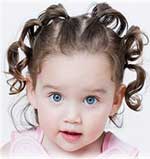
Normal Stages of Human Development (Birth to 5 Years)
This page presents an overview of child development from birth to five years of age.
It is important to keep in mind that the time frames presented are averages and some children may achieve various developmental milestones earlier or later than the average but still be within the normal range.
This information is presented to help parents understand what to expect from their child. Any questions you may have about your child's development should be shared with his or her doctor.
|
Physical and Language |
Emotional |
Social |
|
| Birth to 1 month |
Feedings: 5-8 per day |
Generalized Tension |
Helpless |
| 2 months to 3 months |
Sensory Capacities: color perception, visual exploration, oral exploration. |
Distress |
Smiles at a Face Visually fixates at a face, smiles at a face, may be soothed by rocking. |
| 4 months to 6 months |
Sensory Capacities: localizes sounds Sounds: babbling, makes most vowels and about half of the consonants Feedings: 3-5 per day Motor Ability: control of head and arm movements, purposive grasping, rolls over. |
Enjoys being cuddled | Recognizes his mother. Distinguishes between familiar persons and strangers, no longer smiles indiscriminately. Expects feeding, dressing, and bathing. |
| 7 months to 9 months |
Motor Ability: control of trunk and hands, sits without support, crawls about. | Specific emotional attachment to mother. | Protests separation from mother. Enjoys "peek-a-boo" |
| 10 months to 12 months |
Motor Ability: control of legs and feet, stands, creeps, apposition of thumb and fore-finger. Language: says one or two words, imitates sounds, responds to simple commands. Feedings: 3 meals, 2 snacks Sleep: 12 hours, 2 naps Anger |
Affection Fear of strangers Curiosity, exploration |
Responsive to own name. Wave bye-bye. Plays pat-a-cake, understands "no-no!" Gives and takes objects. |
| 1 years to 1 ½ years |
Motor Ability: creeps up stairs, walks (10-20 min), makes lines on paper with crayon. Dependent Behavior | Very upset when separated from mother Fear of Bath |
Obeys limited commands. Repeats a few words. Interested in his mirror image. Feeds himself. |
| 1 ½ years to 2 years |
Motor Ability: runs, kicks a ball, builds 6 cube tower (2yrs) Capable of bowel and bladder control. Language: vocabulary of more than 200 words Sleep: 12 hours at night, 1-2 hr nap |
Temper tantrums (1-3yrs) |
Resentment of new baby Does opposite of what he is told (18 months). |
| 2 years to 3 years |
Motor Ability: jumps off a step, rides a tricycle, uses crayons, builds a 9-10 cube tower. Language: starts to use short sentences controls and explores world with language, stuttering may appear briefly. Fear of separation |
Negativistic (2 ½ yrs) Violent emotions, anger Differentiates facial expressions of anger, sorrow, and joy. Sense of humor (Plays tricks) |
Talks, uses "I" "me" "you" Copies parents' actions. Dependent, clinging, possessive about toys, enjoys playing alongside another child. Negativism (2 ½ yrs). Resists parental demands. Gives orders. Rigid insistence on sameness of routine. Inability to make decisions. |
| 3 years to 4 years |
Motor Ability: Stands on one leg, jumps up and down, draws a circle and a cross (4 yrs) |
Self-sufficient in many routines of home life. Affectionate toward parents. Pleasure in genital manipulation Romantic attachment to parent of opposite sex (3 to 5 yrs) Jealousy of same-sex parent. Imaginary fears of dark, injury, etc. (3 to 5 years) |
Likes to share, uses "we" Cooperative play with other children, nursery school. Imitates parents. Beginning of identification with same-sex parent, practices sex-role activities. Intense curiosity & interest in other children's bodies. Imaginary friend. |
| 4 years to 5 years |
Motor ability: mature motor control, skips, broad jumps, dresses himself, copies a square and a triangle. Language: talks clearly, uses adult speech sounds, has mastered basic grammar, relates a story, knows over 2,000 words (5 yrs) |
Responsibility and guilt Feels pride in accomplishment |
Prefers to play with other children, becomes competitive prefers sex-appropriate activities |

The above information was sourced from www.childdevelopmentinfo.com
Eating Disorders
Eating Disorders
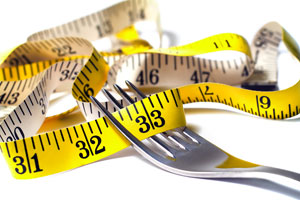
Low Self Esteem
Low Self Esteem

How do you see yourself?
Relationship Concerns
Relationship Concerns

We all have many different types of relationships - we are Partners, Parents, Siblings, distant relatives, friends, & colleagues.
Relationships usually involve some level of interdependence.
People in these various relationships tend to influence each other, in subtle or significant ways.
We share our thoughts and feelings, and engage in activities together.
Because of this interdependence, most things that change or impact one member of the relationship will have some level of impact on the other member.
Sometimes these relationships can be a cause of concern and we just need someone to talk to about it.
Teen & Childhood Obesity
Teen & Childhood Obesity
Obesity is associated with numerous and significant health problems; this also applies to childhood and adolescent obesity. Childhood and adolescent obesity has been associated with a number of significant health problems. This condition significantly increases the risk of hypertension, hypercholesterolemia, hypertriglyceridemia, hyperinsulinemia, and atherosclerosis. Type 2 diabetes mellitus is also becoming more prevalent in adolescents, especially among obese adolescence.The incidence of Type 2 diabetes in children has grown ten fold over recent decades where one third of toddlers are expected to be affected by this condition at some point in their lives. Metabolic syndrome also becomes a concern as 33-50% of obese adolescents have been identified as having metabolic syndrome.
Obstructive sleep apnea syndrome occurs more frequently in obese children and has serious adverse effects on daytime learning and quality of life. More than 50% of all teens seeking bariatric surgery have this condition. Obese children also are at increased risk of pseudotumor cerebri, skeletal complications, and polycystic ovary syndrome. Risk of gynecologic and gastrointestinal malignancies also has been closely linked to obesity, specifically to BMI during the teen years. Non-alcoholic steatohepatitis also occurs in obese youth and may eventually prove to be an important cause of end-stage liver disease for young adults who were obese children.
Obese adolescents are more stigmatized by peers and cite fewer friendships when compared to adolescents without a weight problem. Obesity young adults is associated with higher high school dropout rates, lower rates of satisfaction with life, and lower rates of marriage and later family income.
Obesity confers at least a 2-fold elevation in mortality risk during a 30-year period of follow-up. Racial differences in the risk of premature mortality also has been identified, with black men and women losing over 20 years and 5 years respectively, and white men and women losing 13 years and 8 years respectively as a result of extreme obesity in young adult years

Above information sourced from www.obesityhelp.com



